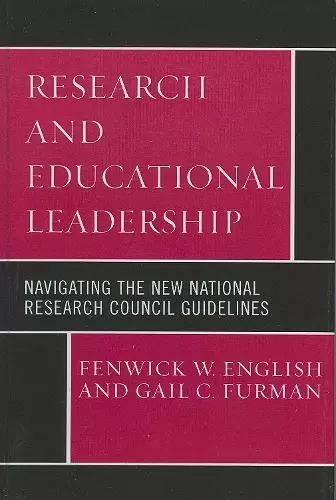Research and Educational Leadership
Navigating the New National Research Council Guidelines
Fenwick W English editor Gail C Furman editor
Format:Hardback
Publisher:Rowman & Littlefield
Published:27th Oct '06
Currently unavailable, and unfortunately no date known when it will be back
This hardback is available in another edition too:
- Paperback£36.00(9781578865512)

Research and Educational Leadership is the first book to directly address the implications of the National Research Council's (NRC's) Scientific Research in Education (2002) in the fields of educational leadership and school administration. This text points out the strengths and weaknesses of the NRC's recommendations and specifically identifies areas that are not likely to lead to either theoretical or practical advances in practice or new knowledge if the NRC's guidelines become dominant in determining the value of research. Research and Educational Leadership is an invaluable tool in rethinking how research is conducted in educational leadership and how public and private funding agencies should view research proposals for improving leadership practices in schools. It is also a key resource for teaching researchers to think more deeply about school leadership as they engage in dissertation research. Practitioners will also find the work an important reference in understanding what kinds of research are likely to promote improved comprehension of leadership practices and social justice.
As a new wave of logical positivism gains momentum in the United States educational system, it is important to reflect on the lessons of history and to understand contemporary critiques of how 'scientific' research can—and cannot—inform educators’ work in schools. The chapters in this book span an impressive array of perspectives and will help researchers and practitioners alike realize the limitations and strengths of scientific research on educational leadership. -- Jeffrey Brooks, Florida State University
Amid criticisms that research in educational leadership has lacked rigor and practicality, this book clearly and evocatively demonstrates that this complex area of inquiry involves more than merely determining what, for example, is the best reading program to be employed in a given school or class. Rather, by acknowledging that the study of educational leadership involves the full range of human art and inquiry, including, but not limited to, theory, philosophy, law, and curriculum, to name a few, the authors challenge educational researchers (and consumers) to come to grips with some of the quintessential questions that vex the professional lives of academicians and practitioners who are interested in improving the quality of leadership for our schools. -- Charles J. Russo, Ed.D., J.D., Panzer Chair in Education, University of Dayton
The seven chapters raise a number of pertinent issues about relevance and rigor that deserve the attention of all researchers...Highly recommended. * CHOICE *
I commend each of the authors in this book for stimulating the dialogue in our profession on the relevance and rigor of educational research. They all have contributed to that continuing purpose of UCEA to inform and improve research that benefits all students, families, and educators. -- Gary M. Crow, UCEA Executive Committee member and chair of the Department of Educational Leadership and Policy, University of Utah
ISBN: 9781578865505
Dimensions: 240mm x 160mm x 20mm
Weight: 417g
192 pages